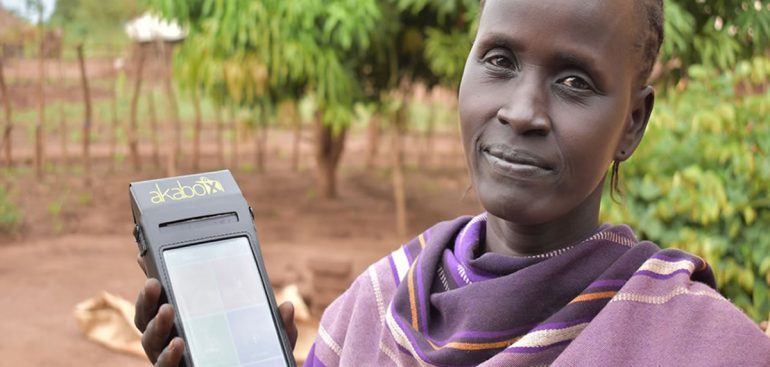When women empowerment takes another course in Kiryandongo refugee settlement.
Sarah Atuhaire, the co-founder of Akaboxi, a digital financial inclusion system that enables communities to manage and monitor their savings together, shares insights about community empowerment through technology from Kiryandongo refugee settlement.
Although statements that insinuate women are ‘redefining’ roles or have made their ‘mark’ or are ‘great leaders’ are common, many use ‘women empowerment’ to refer to well positioned, economically-empowered women in white collar jobs.
It was during my visit to Kiryandongo in northern Uganda that I came face to face with the real meaning of women empowerment from an ordinary rural woman’s point of view. In Kiryandongo refugee settlement, women are visibly engaged. From taking the lead to provide for their families to get involved in a range of socio-economic activities including businesses, politics and conflict resolution, women are surely taking their place.
With support from the Response Innovation Lab – which was set up to find creative solutions to challenges in delivering humanitarian aid – and in partnership with Save the Children, my organization Akaboxi interacted with groups of women who had come for training in digital financing. A bit about the training: we are exploring new and innovative ways of enhancing refugees’ financial literacy through developing robust and secure ways of handling their savings through the use of new technology. Akaboxi, a new digital tool used by local women saving groups, replaces rudimentary methods of keeping money in boxes in people’s homes – where they could often be lost or stolen – to a more reliable and easy to monitor system.
Just from casual observation, you would see men easily outnumbered the women in the refugee settlement. I also saw so many children. Perhaps speaking to the reality we all have heard about; war disproportionately affects women and children more than the men. The women I spoke to on the sidelines of the training spoke of harrowing tales of escape, death, trauma, loss of loved ones including children, relatives, and husbands. But in all these tales, there was still flickering lights of hope, of not giving up, of having to see their young children through school despite the situation in settlements, of one day returning to peace in their home countries and waiting for the return of missing loved ones.
Almost all women I spoke to said they started their day with preparing their children for school which speaks to the value they attach to their children’s education and thereafter going out to engage in different economic activities. “I can’t sit at home, who will take care of children’s needs and mine,” rhetorically asked one of the women I was talking to. ‘But you have a husband,’ I shoot back. This seemed a common thread in my conversations with many refugee mothers, who despite having husbands, have to fend for themselves to put food on the table.
And they seem to have embraced this new found responsibility with gusto because they speak passionately about their businesses and they have grand expansion plans once they have saved enough money with the support of Save the Children and Akaboxi. It is these women that my company Akaboxi has set out to help. After a long period of saving, such a woman wouldn’t want to see a lazy husband snatch their hard-earned savings to go drink alcohol or marry younger brides. And with high cases of domestic violence in homes, fire outbreaks and insecurity, digital savings becomes a safe and cheap alternative for rural women.
We found most women in Kiryandongo had already formed village saving and loan groups under the mentorship of Save the Children and with this added-value cheap, convenient and secure technology, the sky is going to be the limit for these enterprising women.
By
Sarah Atuhaire Baryaija-Cofounder of Akaboxi
But I must explain to you how all this mistaken idea of denouncing pleasure and praising pain was born and I will give you a complete account of the system, and expound the actual teachings of the great explorer of the truth, the master-builder of human happiness. No one rejects, dislikes, or avoids pleasure itself, because it is pleasure, but because those who do not know how to pursue pleasure rationally encounter consequences that are extremely painful. Nor again is there anyone who loves or pursues or desires to obtain pain of itself, because it is pain, but because occasionally circumstances occur in which toil and pain can procure him some great pleasure.
- Customer experience, which includes the impression the homepage and overall design style give the customers their satisfaction when they interact with the site and perform tasks.
- Service-level, which looks at responsiveness and reliability of websites – scores them on how quickly they respond to user commands and such factors as average downtime.
- Best practices, such as ease of use, quality, availability and security – site managers must be compliant with data laws requiring them to protect customer information and the integrity of customer accounts.
At vero eos et accusamus et iusto odio dignissimos ducimus qui blanditiis praesentium voluptatum deleniti atque corrupti quos dolores et quas molestias excepturi sint occaecati cupiditate non provident, similique sunt in culpa qui officia deserunt mollitia animi, id est laborum et dolorum fuga. Et harum quidem rerum facilis est et expedita distinctio. Nam libero tempore, cum soluta nobis est eligendi optio cumque nihil impedit quo minus id quod maxime placeat facere possimus, omnis voluptas assumenda est, omnis dolor repellendus.

